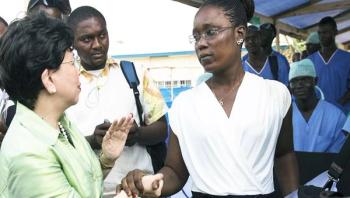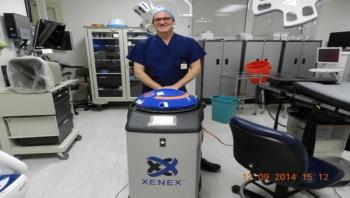
News


An international research team has shown how changes in a flu virus that has plagued Chinese poultry farms for decades helped create the novel avian H7N9 influenza A virus that has sickened more than 375 people since 2013. The research appears in the current online early edition of the scientific journal Proceedings of the National Academy of Sciences.







For many people, Dec. 22, 2014 was the beginning of the holiday season. But for Rebeca Johnson, a Sierra Leone nurse who survived Ebola, it marked a return to work -- and a new lease on life.

In early July, Inger Damon, MD, PhD, was in Colorado, training at altitude for an extreme 17.1-mile run. But at the end of that month, she found herself running a much more difficult marathon. Not that her planned entry in September’s Imogene Pass Run -- a grueling trek that climbs over 5,300 feet to the 13,114-foot Imogene Pass and descends into Telluride – wouldn’t have been a challenge. But on July 30, she was named Incident Manager to head the Ebola response at CDC’s Emergency Operations Center (EOC). Since then she’s had just four days off.








The world owes a debt of gratitude to Simon Fraser University biologist Regine Gries. Her arms have provided a blood meal for more than a thousand bed bugs each week for five years while she and her husband, biology professor Gerhard Gries, searched for a way to conquer the global bed bug epidemic. Working with SFU chemist Robert Britton and a team of students, they have finally found the solution -- a set of chemical attractants, or pheromones, that lure the bed bugs into traps and keep them there.




Xenex Disinfection Services announces that St. Cloud Surgical Center is the first ambulatory surgery center (ASC) in the U.S. and the first healthcare facility in St. Cloud to utilize a Xenex germ-zapping robot to enhance patient safety by destroying the deadly pathogens that can cause healthcare-associated infections (HAIs). St. Cloud Surgical Center is using Xenex’s full-spectrum UV disinfection system to disinfect its surgical suites daily.





Antibiotic-resistant bacteria, considered one of the world’s most urgent public health problems, infect more than 2 million people in the U.S. each year and cause at least 23,000 annual deaths. The Centers for Disease Control and Prevention (CDC) estimates that antibiotic resistance results in direct healthcare costs of $20 billion annually.

